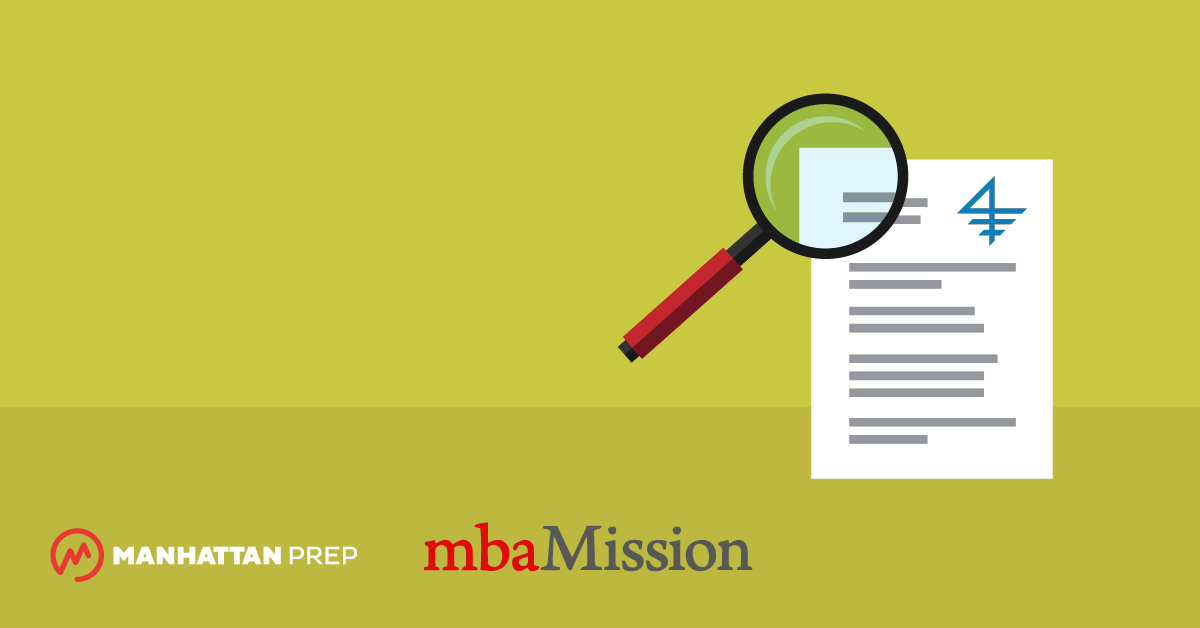Why Robots Aren’t So Good at GMAT Sentence Correction

Greetings, reader. I wish to determine whether you are a robot. To help me do so, I will show you a sentence, and then ask you a very simple question about the sentence. Just so you know, the sentence uses correct grammar and would be an acceptable answer choice were it to appear in a GMAT Sentence Correction question. Please don’t worry about correcting the sentence; instead, just read it and then answer the question. Ready? Read more
Sucking All the Juice Out of GMAT Quant Problems (Part 2)

Grab your Official Guide as we walk through 3 GMAT Quant problems (Problem Solving), hoping to drink every drop of knowledge from the problem before we say, “Yo, that keg is kicked.”
In part 1, we discussed the process of maxing out the value of the GMAT Quant problems you do.
As you review them, classify your current level of mastery for that problem. Read more
Columbia Business School Essay Analysis, 2018-2019

How can you write essays that grab the attention of MBA admissions committees? With this thorough Columbia Business School essay analysis, our friends at mbaMission help you conceptualize your essay ideas and understand how to execute, so that your experiences truly stand out.
Columbia Business School (CBS) has just released its essay questions for this year, and the admissions office is offering applicants “a little bit old and a little bit new.” Its micro essay (really just a goal statement, to be fair) and first essay remain unchanged, while its second essay is a repackaging of a prompt from two years ago, and its third is brand new. In the past, for its third essay, Columbia Business School applicants could choose from two prompt options, generally pertaining to their personal lives and passions; now, candidates must respond to a question about a team failure instead. In short, this year, applicants have less choice with their essays (though the word counts have not changed), and the topics involved skew slightly in favor of the professional and academic and away from the personal. Let’s jump into our Columbia Business School essay analysis… Read more
Executive Assessment: Fast Math for Faster Solutions (Part 2)

Last time, I gave you a couple of questions to try and then we discussed how to minimize your work on the first one. (If you haven’t read the first installment yet, go do that now.) Today, we’re going to review the second problem. Read more
How to Use Parallel Construction in Your MBA Application Essays

Longer and more complex sentences often require parallel construction. Simply put, parallel construction ensures that any given longer sentence has a standard rhythm or construction. With parallel construction, each pronoun corresponds with another pronoun, each verb corresponds with another verb, each adjective matches with a corresponding adjective, and so on. Parallel construction can certainly be found in shorter sentences as well, and to great effect. Read more
Using Data to Ace the GMAT

Over the last two articles, I analyzed what we know about missing GMAT Quant questions and missing GMAT Verbal questions. As it turns out, you can miss a lot of questions on the GMAT. Getting a lot of wrong answers doesn’t guarantee you a bad score—and getting a lot of right answers doesn’t guarantee you a good score. Read more
MBA Admissions Myths Destroyed: My Work Performance is All That Matters

What have you been told about applying to business school? With the advent of chat rooms, blogs and forums, armchair “experts” often unintentionally propagate MBA admissions myths, which can linger and undermine an applicant’s confidence. Some applicants are led to believe that schools want a specific “type” of candidate and expect certain GMAT scores and GPAs, for example. Others are led to believe that they need to know alumni from their target schools and/or get a letter of reference from the CEO of their firm in order to get in. In this series, mbaMission debunks these and other myths and strives to take the anxiety out of the admissions process.
Because you spend so many of your waking hours at work, and the MBA is the vehicle you are choosing to use to drive your career forward, you may naturally believe that your professional experiences are all that matter to the admissions committees. Do not get us wrong: you need to have strong professional stories to share, but top-tier business schools are looking for much more than just examples of professional excellence. If you discuss only your work experiences in your application, you will present yourself as a one-dimensional character, and today’s managers need to demonstrate that they can handle a multitude of tasks, situations, and personalities—both inside and outside the workplace. Read more
GMAT Mindset: Honesty is the Best Policy

No, this isn’t a post about test ethics, though you certainly should not cheat on the GMAT! Rather, this is about honesty with yourself as you get in the GMAT mindset while studying and especially in the middle of the test itself. Read more
Sucking All the Juice Out of GMAT Quant Problems

Remember how you’d finish off a Capri Sun pouch by twisting it up, trying to get out every precious drop of those 6 ounces of happiness? Capri Sun always left you wanting more… something never said about a Judd Apatow movie.
Let’s do the same thing with OG GMAT Quant problems. In order to extract all the potential value from doing an OG problem, you’re going to need to deeply review it, and then (in the vast majority of cases), you’re going to need to redo it once or twice a later date. Why? Read more
How to Approach Overrepresentation and Old Achievements in Your MBA Essay

Many MBA applicants worry that they are overrepresented—male investment bankers and Indian software engineers, for example. Applicants cannot change their work histories, of course, but they can change the way they introduce themselves to the admissions committee in their MBA essay. Consider the following examples: Read more